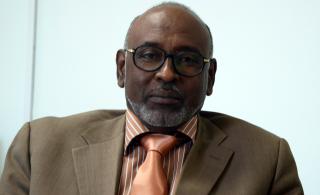From the Economic Conference (3): Will the Government Overcome the Challenge of Funding Reconstruction and Development Programs?

Professor Ahmed Magzoub Ahmed
Securing funding for reconstruction and development projects and adopting appropriate policies represent the primary challenge that the Ministry of Finance and Economic Planning, along with all state institutions, must address. Experts and scholars should unite their efforts to tackle this challenge, which demands non-traditional planning methods. The exceptional current circumstances necessitate innovative approaches, prompting the Ministry to adopt financial tools and strategies that can generate the needed resources.
The Ministry of Finance’s paper presented at the conference proposed a conventional budget for financing routine government expenditures for the fiscal year 2025 amidst a sharp decline in revenues. However, the paper did not outline specific allocations for reconstruction and development programs, potentially leaving such arrangements to be determined as conference recommendations. This calls for collective efforts to provide solutions.
Given the current situation, one might ask—justifiably—whether it is possible to secure the financial resources necessary to achieve economic reconstruction and development.
The traditional answer is that nothing is impossible under the sun (with God’s will). If there is determination, willpower, and meticulous economic and financial planning, economic leadership can find ways to access both domestic and foreign funding sources. Numerous countries’ experiences affirm this possibility.
Political Support as the First Step
The Ministry must first garner political support for proposed plans by mobilizing a wide base of support, especially from those aligned with the armed forces. These forces, embodied by the masses of volunteers eager to liberate the nation, have laid a robust foundation for supporting state programs in production and reconstruction. The government must craft a narrative emphasizing that the battle for national independence extends beyond liberation to achieving reconstruction, self-sufficiency, and the neutralization of adversaries’ attempts to destroy the economy and impoverish the population.
Coordination Among Key Institutions
The primary avenue to overcome this challenge is ensuring comprehensive coordination among economic sector ministries and the Central Bank of Sudan to agree on quantitative goals and the policies needed to achieve them. This harmony reassures stakeholders of institutional clarity and commitment. Coordination must also include private sector organizations (financial, banking, and production sectors), as they will spearhead this effort.
Expanding Private Sector Roles
The Ministry should adopt policies that expand the private sector’s role in managing and delivering certain services, activities, and projects. This approach is more efficient and cost-effective, especially for creating new employment opportunities without imposing additional obligations on the government amidst declining revenues. Numerous national and international experiences highlight the private sector’s efficiency in managing such tasks, including infrastructure and even some security-related activities. Clear and stable policies must be established, protected by legislation, to provide confidence to domestic and foreign investors.
Innovative Financing Solutions
While the Ministry of Finance’s paper addresses issues like expanding the tax base and rationalizing government spending, I propose imposing a reconstruction tax on affluent individuals within Sudan and Sudanese expatriates. This tax should vary based on income, regardless of how minimal, to foster a sense of shared responsibility and national contribution.
Given the decline in traditional financial resources due to the destruction of key economic sectors, the government must explore extraordinary and external funding sources. This includes granting production and operational concessions in sectors like oil exploration, mining, agriculture, livestock, and tourism. The Ministry should establish clear and stable policies for managing and exploiting these resources, supported by the necessary legislation, to attract partnerships with foreign companies and governments under fair and competitive terms.
Preparing Reconstruction Project Files
Attracting funding hinges on the readiness of projects, including their scope, financing requirements, expected returns, and contractual arrangements. This demands collaborative efforts between the Ministry of Finance, private sector institutions, and relevant government bodies to prepare detailed project proposals. Subsequently, a diplomatic and economic outreach program targeting friendly nations and financial institutions within regional and international spheres should be initiated, engaging both governments and private sectors.
The Ministry should also leverage emerging economic blocs like BRICS and strengthen ties with China, India, and Russia by resolving outstanding issues, especially with China. Various financing models, such as Build-Operate-Transfer (BOOT), Public-Private Partnerships (PPP), and Foreign Direct Investment (FDI), should be explored.
Internal Reconstruction Funds
Establishing internal reconstruction funds in local currency, with varying denominations to enable public participation, is another proposal. These funds’ proceeds would directly support reconstruction programs. The Ministry could mandate banks to accept these instruments as loan guarantees. Additionally, issuing financing bonds tied to specific projects or as general bonds for reconstruction could attract local and international investors. These instruments have proven successful globally, as seen in Egypt, where bond subscriptions exceeded 150% in 2022.
Exploiting Strategic Resources
The expansion of operations along the Red Sea coast, particularly through specialized commercial ports, offers promising opportunities. Strategic utilization of these resources under financial arrangements favorable to the government can generate the necessary reconstruction funds.
Restoring Economic Confidence
Rebuilding trust in Sudan’s economy and adhering to contractual obligations are pivotal. The government must adopt a “win-win” policy, ensuring all parties benefit from economic relations.
Reconstruction and rehabilitation of private sector projects warrant separate discussions. Until then, we pray for success in overcoming Sudan’s challenges and achieving its goals.
May God bless our efforts, guide us to wisdom, and grant victory to our armed forces and defenders against the nation’s enemies and conspirators.



